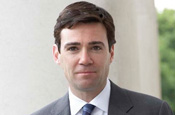
The legalisation of product placement is one of several changes to the UK TV regulatory landscape that could result from the introduction of the European Union's Audiovisual Media Services (AVMS) directive, Brussels' set of legislation that governs Europe's audiovisual and media industries.
To date, the UK government has already consulted on two of the directive's key rule changes - the regulation of VoD services for the first time and the increase in TV broadcasters' ad minutages.
Next, the Department for Culture, Media and Sport, led by Culture Secretary Andy Burnham, will in the summer consult on another of its key changes, the legalisation of product placement.
The probe will be held in conjunction with Ofcom, whose codes currently ban product placement.
The new regulation, which replaces the 1997 TV Without Frontiers Directive, was given the green light by the European Parliament last May and the UK Government has less than two years to incorporate it into UK law.
A spokesman for the DCMS said: "The AVMS directive allows the UK and other member states to permit product placement in certain types of programme. We are not compelled to do so - it is up to each member state to decide whether to change current rulings."
Tess Alps, chief executive of TV marketing body Thinkbox, broadly welcomed the idea of legalising product placement in the UK. "Clearly the UK would welcome a more level playing field," she said. "The fact is that we're all watching a lot of product placement, or product integration, in series imported from the US."
However, another senior TV executive argued that the money made through allowing product placement would be minimal for broadcasters, adding that most of it would go to the production companies that agree to feature certain brands' products.
To date, the UK government has already consulted on two of the directive's key rule changes - the regulation of VoD services for the first time and the increase in TV broadcasters' ad minutages.
Next, the Department for Culture, Media and Sport, led by Culture Secretary Andy Burnham, will in the summer consult on another of its key changes, the legalisation of product placement.
The probe will be held in conjunction with Ofcom, whose codes currently ban product placement.
The new regulation, which replaces the 1997 TV Without Frontiers Directive, was given the green light by the European Parliament last May and the UK Government has less than two years to incorporate it into UK law.
A spokesman for the DCMS said: "The AVMS directive allows the UK and other member states to permit product placement in certain types of programme. We are not compelled to do so - it is up to each member state to decide whether to change current rulings."
Tess Alps, chief executive of TV marketing body Thinkbox, broadly welcomed the idea of legalising product placement in the UK. "Clearly the UK would welcome a more level playing field," she said. "The fact is that we're all watching a lot of product placement, or product integration, in series imported from the US."
However, another senior TV executive argued that the money made through allowing product placement would be minimal for broadcasters, adding that most of it would go to the production companies that agree to feature certain brands' products.



_1.jpg)
.jpg)
